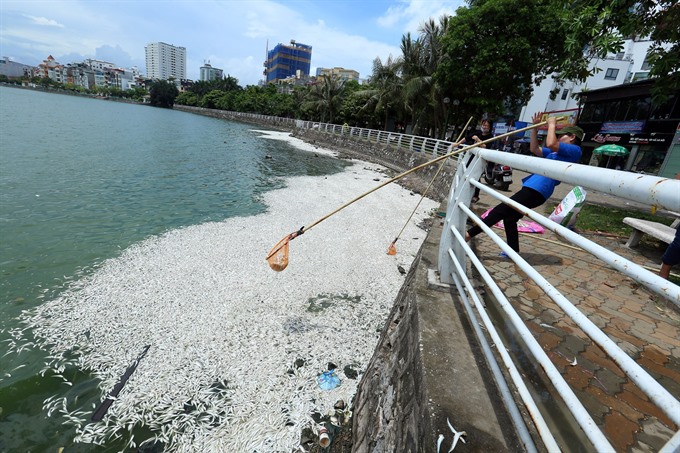 Environment
Environment

Thousands of dead fish were found floating in Hà Nội’s West Lake, the capital’s largest lake and a popular scenic spot, over the weekend, posing a health hazard to those living nearby.
 |
| Environmental workers clear dead fish from the shores of Hà Nội’s West Lake yesterday. — VNA/VNS Photo Huy Hùng |
HÀ NỘI — Thousands of dead fish were found floating in Hà Nội’s West Lake, the capital’s largest lake and a popular scenic spot, over the weekend, posing a health hazard to those living nearby.
The dead fish were first spotted on Saturday afternoon near Lạc Long Quân Street and Tây Hồ Temple.
By Sunday afternoon, environmental workers had collected more than 20 tonnes of dead fish and transported them to the Nam Sơn landfill site in the suburban district of Sóc Sơn for disposal.
Dead fish were also reportedly seen at the lake on Monday morning. The dead fish, mostly tench and tilapia, were floating along the shores of the lake, mainly along Trích Sài, Quảng Bá and Nhật Chiêu streets.
Initial test results showed that the fish had died from a lack of oxygen caused by abnormal weather patterns. A prolonged heatwave was cut short by heavy rainfall over the weekend.
Speaking at a press conference yesterday, director of the Department of Construction, Lê Văn Dục, said that the department had found that the amount of wastewater discharged into the lake was minimal.
Hà Nội Drainage One Member Co, Ltd said it had taken samples of water and fish from the lake for testing. The results showed that the amount of oxygen along the shore was quite low, but levels in the middle of the lake were normal.
The company has sent 500 workers to collect dead fish and dispose of them safely to protect the surrounding environment.
The dead fish have caused a serious odour and affected the lives of people living or working in the area.
Nguyễn Sơn Tùng, a resident of Lạc Long Quân Street, said that this was not the first time fish had died en masse in the lake.
A few years ago, his family had to suffer the horrible smell when hundreds of tonnes of fish suddenly died, leaving the surface of the lake covered with rotting carcasses.
Chairman of Tây Hồ District’s People’s Committee Đỗ Anh Tuấn said that the committee had asked the city to revise breeding and fishing regulations for the lake to ensure cleanliness and oxygen levels.
In 2016, over 200 tonnes of dead fish were reportedly collected from the lake between October 1 and October 4.
A preliminary report from Hà Nội’s People’s Committee showed that oxygen depletion was partially to blame for the environmental catastrophe. Results from water samples tested later indicated that the oxygen index was at zero and the ammoniac index was 24 times higher than the permitted level.
Authorities have been instructed to install 40 aeration devices to provide oxygen for the fish in the lake and sterilise the tainted areas. Environmental police have also been mobilised to stop anyone from dumping waste.
The disaster has forced many restaurants and coffee shops to close and some local residents are staying with relatives because of the smell. – VNS




